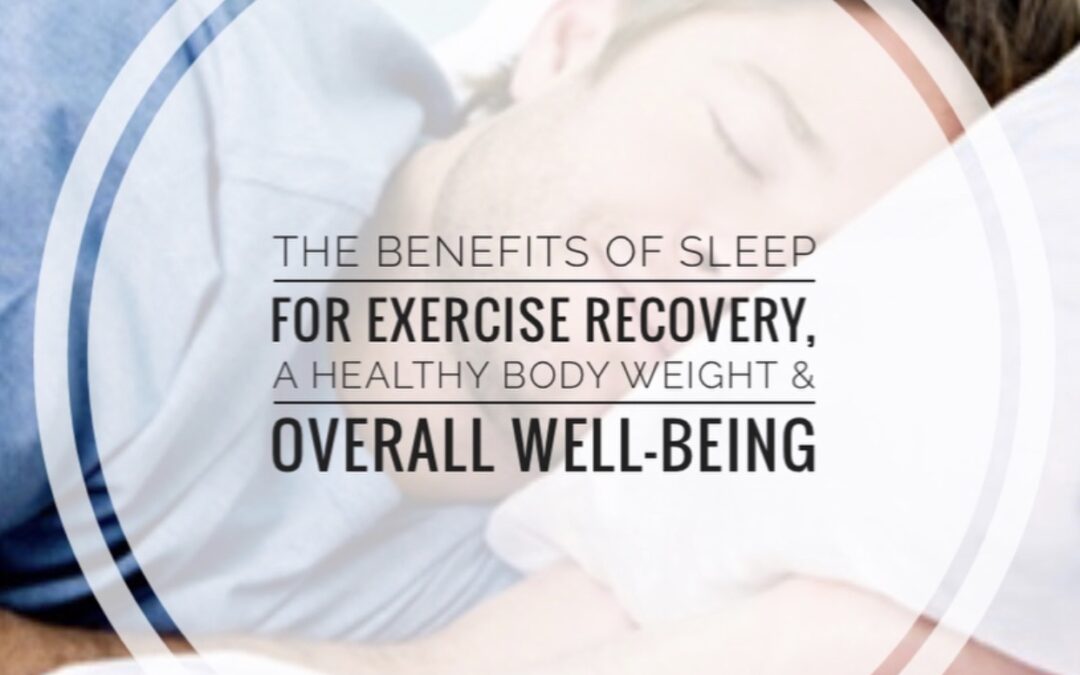Inadequate sleep can negatively impact your body weight, exercise performance, muscle recovery, brain function and many aspects of health. Learn about the importance of sleep and how to get more.

Healthy eating, drinking water and getting plenty of physical activity are all part of a healthy lifestyle. But, there’s one healthy habit that might be even more important than those. It’s getting enough sleep.
Getting adequate sleep impacts just about all aspects of your well-being. That’s because, all of your body’s physiological functions rely on sleep to function optimally. If you don’t get enough, your mental, physical and emotional health can be compromised. Even worse, inadequate sleep can get in the way of reaching your goals.
How Much Sleep Do You Need?
One of the first questions that I ask my clients is how much sleep they get. The answers are all over the board. Some people recognize that they need more sleep to function optimally. Others, though, feel like they can function on just a few hours.
To answer the question of how much sleep you need, the National Sleep Foundation called upon a multidisciplinary panel to review the scientific evidence. After reviewing the research, the panel put together a formal consensus, and created sleep duration recommendations for 9 different age groups. The sleep recommendations, based on hours of sleep each day, are as follows:
| Age Group | Hours Of Sleep Per Day |
| Newborn, 0-3 years old | 14-17 hours |
| Infants, 4-11 months old | 12-15 hours |
| Toddlers, 1-2 years old | 11-14 hours |
| Pre-Schoolers, 3-5 years old | 10-13 hours |
| School-Aged Children, 6-13 years old | 9-11 hours |
| Teenagers, 14-17 years old | 8-10 hours |
| Young Adults, 18-25 years old | 7-9 hours |
| Adults, 26-64 years old | |
| Older Adults, 65 or more years old | 7-8 hours |
In the consensus report, the panel recognized that the ideal amount of sleep can vary from one person to another. That’s why they created ranges within each age group. To determine how much sleep you need, consider the recommendations. But, you should also take into account your personal heath, activity level, and how you feel after getting a specific number of hours of sleep.
Why Is Sleep Important?
As I mentioned above, sleep impacts more than just how you feel. It can influence how you perform day-to-day functions, and your ability to reach your goals. If you need some motivation to get more sleep, consider how getting enough can help, or hinder, you from being your best.
The Importance Of Sleep For A Healthy Body Weight
If you’ve ever tried to change your eating habits, you know it can be difficult – especially in the evening hours. While there are many reasons why over-eating tends to happen more at night, being tired can get in the way of making good decisions. Research shows that sleep deprivation can hinder your brain’s decision-making capacity by stimulating the brain’s reward and motivation regions. That can result in you choosing unhealthy foods. Getting fewer hours of sleep is also associated with eating more total food. That makes sense, since the more hours you spend awake, the more opportunity you have to eat.
There is plenty of research showing a relationship between shorter sleep duration and body weight. One study, though, took it a step further. Investigators studied 1,088 sets of twins (2,176 total individuals), to see if sleep duration would modify the genetic and environmental factors influencing their BMI. The study showed that longer sleep duration could counteract the genetic influences on body weight.
The Importance Of Sleep For Exercise Quality And Duration
When clients tell me that they are tired, I always suggest physical activity. That’s because, studies show that exercise can actually help improve the quality of your sleep. The relationship between exercise and sleep goes the other way, too. The duration of your sleep influences the quality of your exercise.
The decrease in mental focus that comes from poor sleep habits can negatively impact your safety. But, your physical performance can be impacted, as well. A study published in Sports Medicine showed that the time to exhaustion is decreased in sleep deprived individuals. That means, your exercise session could be cut short, negatively impacting any potential performance improvements that you were hoping for.
Research clearly shows negative effects of sleep deprivation for athletes. Overall performance, including reaction time, accuracy, vigor, submaximal strength, and endurance are all compromised. Cognitive functions such as judgment and decision-making also suffer. You need to be fully engaged both mentally and physically to get the most out of your workout, so be sure to get enough zzz’s.
Inadequate Sleep May Slow Muscle Recovery
The importance of sleep is often underestimated. In addition what is mentioned above, inadequate sleep could impact your body’s ability to recovery optimally. Hormones that aid in muscle recovery and bone health are released during sleep, and cutting your time short could slow muscle recovery time. Growth hormone, which stimulates muscle growth and repair, bone building and fat burning, is released during periods of deep sleep. For that reason, researchers believe that it is getting enough deep sleep that has the most impact on athletic performance.
The Importance of Sleep On Brain Health
If you want to improve your focus, getting adequate sleep might help. Research shows that cognitive performance involving attention, processing and working memory are all sensitive to sleep duration below 7 hours a night. That’s because insufficient sleep interferes with memory, learning, attention and mood.
The Importance of Sleep For Immune Function And Overall Health
When you don’t get enough sleep, the body triggers the release of adrenaline, cortisol and other stress hormones. Over time, that can lead to the risk of cardiovascular disease. Inadequate sleep also reduces the immune response to infection by reducing cytokine production. It’s also been shown to alter blood glucose and insulin metabolism, increasing the risk of developing diabetes.
Tips To Help You Get More Sleep
Getting more sleep usually isn’t as easy as crawling into bed earlier. You’ll need to adopt some nighttime strategies and practice. Over time, you can train your mind to quiet down and begin to fall asleep easier.
To start with, create a bedtime routine. Determine a reasonable time for you to go to sleep, and stick to it. Going to bed, and waking up, at the same time each night and morning, helps to train your mind to quiet down.
Consider your sleeping arrangements, too. Make sure you have a quality mattress and a pillow that you find comfortable and try to maintain a good temperature in your bedroom. You also want to minimize any light that shines into your room.
If you struggle to fall asleep, try reading a book or trying other relaxation techniques. The National Sleep Foundation has more tips to help you fall, and stay asleep longer.
The importance of sleep shouldn’t be underestimated. If it is not there already, be sure to move sleep to the top of your priority list. If it’s not, it will be more challenging to reach your health and fitness goals.


 Hi, I’m Heather – a registered dietitian, busy mom, consultant, adventure junkie and travel addict who has mastered living healthy on the go. My blog is where I share simple recipes and healthy living tips to help and inspire others to live their best life.
Hi, I’m Heather – a registered dietitian, busy mom, consultant, adventure junkie and travel addict who has mastered living healthy on the go. My blog is where I share simple recipes and healthy living tips to help and inspire others to live their best life.